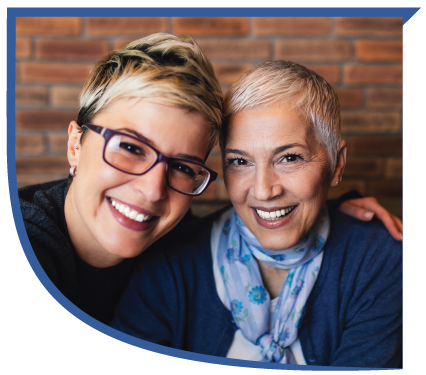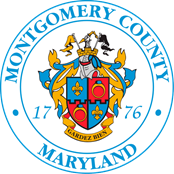Caregiving Support

Every day as a caregiver you experience joys and challenges. All caregivers benefit through: practical guidance, emotional support and as needed: connection with skilled providers. In Montgomery County there are helpful supports available through government, non-profit organizations and private businesses.
Caregiver support is a vital part of our community.
On this page
Commonly Asked Questions
Montgomery County Aging and Disability Services ( | 240-777-3000) : Knowledgeable County professionals help seniors and their caregivers with a wide range of topics and advice. Staff listen, recommend local resources around the County, and help with program applications when needed. Calls are answered directly by a trained staff person. If specialists are busy, your wait on hold should be less than 30 seconds. You can also choose to leave a message for a call-back within one business day.
Hours are Monday – Friday 8:30 a.m. - 5:00 p.m. For the convenience of caregivers who may not be able to call during the work day staff take calls until 7:30 p.m. Tuesday, Wednesday and Thursday. Bilingual staff and translator services available.
Holy Cross Hospital Caregiver Resource Center (301-754-7152) Take advantage of many services for caregivers including a helpline, support groups, library and newsletter. The center offers a Caregiver Telephone Helpline to answer questions about services and resources for caregivers. Caregiver support groups for spouses and adult children provide a place to share sorrows and successes, resources and solutions. Classes are available on topics ranging from handling a parent's finances to first aid and CPR. The center's health information library provides caregivers access to books, DVDs, audiotapes and videotapes on caregiver issues and health-related topics, as well as listings of aging adult services in our community. The center's newsletter is published three times a year to provide tips, book reviews, resources, articles on caregiving, and listings of the center's upcoming seminars, lectures and support groups.
Alzheimer's Association (1-800-272-3900) The Alzheimer's Association is the leading voluntary health organization in Alzheimer's care, support and research. Access information and resources through the Association's web site and free, professionally-staffed 24/7 Helpline with translation services in more than 200 languages. Education programs and support groups are offered both in the community and online. Support groups provide a place for friends and family to share valuable information, caregiving tips and concerns throughout the Alzheimer's journey. Please call the helpful line before attending a group for the first time to verify meeting information, obtain directions or other information about the group, as schedules and times change occasionally.
The Arc Montgomery County – Respite Coordination (301) 984-5777 x1204
If you reside in Montgomery County and are an unpaid, primary caregiver for an older adult or person with a disability living in the same household, you may apply for respite coordination from The Arc Montgomery County.
Respite Coordination can provide short-term relief for a few hours, a day, a weekend, or sometimes longer. However, respite care is not a substitute for ongoing care or adult day care. It's just a way to support families who take care of their loved ones at home. Families can choose from many respite care venues, including the family home, adult medical day programs, and approved respite facilities. Respite may provide a subsidy to pay a Respite Care Provider (RCP), but it is not an entitlement. Eligibility for a subsidy does not guarantee funds for each respite occasion requested. There is limited funding for respite care and our goal is to assist as many families as possible each month. The Arc Montgomery County, Respite Coordination is primary funded through the Montgomery County’s Department of Health & Human Services.
Medical Day Care is a structured nonresidential program that provides health, social, and related support services. Such Adult Day Centers support medical, health or functional needs and an opportunity for social interaction. They may allow caregivers a regular means to continue to work outside the home while receiving help with the care of a loved one or a periodic break (respite) in which to attend to personal needs. Contact 240-777-3000 to learn more and find a program.
Montgomery County Aging and Disability Services
- Visit Montgomery County Aging and Disability Services to find out about senior services available in your community. If in doubt, call us!
- Call 240-777-3000 (or Maryland Relay at 711)
- Hours:
- Monday – Friday 8:30 am - 5:00 pm
- Tuesday, Wednesday, and Thursday until 7:30 pm
- Bilingual staff and translator services are available.
Video Resources
Did You Know? - Cargiving Support Video
Did You Know - Episode 67 - we talk about the many aspects of caregiving in Montgomery County Maryland.
Caregiving & Dementia Education Video Series
Understanding Responsive Behaviors Part 1
Watch Part 2 on YouTube
Trualta - for Family Care Givers
Montgomery County caregivers have a free place to turn for practical, trusted support.
Montgomery County DHHS Partners with Trualta to Support Family Caregivers
Montgomery County Department of Health and Human Services (DHHS) is partnering with Trualta—an online caregiver education and support platform—to provide complimentary access to caregivers across Montgomery County. This new service is designed to help caregivers feel more confident, better prepared, and less alone as they support a loved one at home.
Caregivers can visit care4mc.trualta.com to easily create an account and begin exploring resources at no cost, as a service provided by Montgomery County DHHS.
What is Trualta?
Trualta is a caregiver education and support platform created to help informal caregivers build skills and confidence. It’s available anytime, from any device, and includes clinically validated resources, practical tutorials, and a supportive community—so caregivers can get help when they need it, in the moments that matter.
Why this matters for caregivers
Most family caregivers start their journey without training or ongoing support. Trualta was built to change that—making it easier to learn, connect, and feel more confident providing care.
Through the Care4MC portal, caregivers can access:
- Skills-based, self-paced learning that fits into real life (on a phone at an appointment or at home after a long day)
- Practical tutorials and guidance to support safer, more confident caregiving
- Support for caregiver stress, burnout, and isolation, with resources that help caregivers care for themselves, too
Launch date: February 9, 2026
Portal link: care4mc.trualta.com (live Feb 9)
Montgomery County DHHS is proud to offer this service at no cost, helping ensure caregivers have easy access to training, tools, and support—right when they need it most.
bookmark the portal: care4MC.trualta.com
| Name | Description |
|---|---|
| Alzheimer’s Association Online Community | Share your thoughts and needs with other caregivers. This site offers information and support from people who are in similar situations. |
| Connect-A-Ride - (301-738-3252) | Access this free, County-funded information and referral program that helps seniors, 50+, and adults with disabilities find transportation for medical services, grocery shopping, errands, and other needs. Connect-A-Ride staff provides guidance for those applying for Metro Access and Call N Ride and those seeking paid and volunteer escorted transportation services. Find out if you qualify for programs with financial subsidies. |
| Eldercare Locator | The Eldercare Locator is a nationwide service that connects older Americans and their caregivers with trustworthy local support resources. Since 1991, the Eldercare Locator has been linking those who need assistance with state and local agencies on aging, as well as community-based organizations that serve older adults and their caregivers. Whether help is needed with services such as meals, home care, or transportation, or a caregiver needs training and education or a well-deserved break from caregiving responsibilities, the Eldercare Locator is there to point that person in the right direction. The Eldercare Locator is a public service of the Administration on Aging (AoA), an agency of the U.S. Administration for Community Living. |
| Family Caregiver Alliance | This website provides advice, fact sheets, disease information, and access to online discussion groups and audio presentations. |
| Lotsa Helping Hands | Free website for coordinating a group of family and friends to help with various tasks. Caregivers set up a members-only community and then post jobs on the website’s calendar, such as providing a ride to the doctor or doing laundry. E-mail is sent to the community members to alert them to new tasks. |
| Montgomery County's Dementia Friendly Initiative | Montgomery County’s Dementia Friendly America initiative was adopted in 2015 and in early 2016 we formed an Action Team (advisory group). This Action Team represents public-private stakeholders, meets quarterly, and provides guidance and assistance. The Action Team is supported by workgroups including Public Safety, Communications, and Continuum of Care. Our first project was initiated by the Public Safety workgroup and its departmental leaders (Police and Fire & Rescue) and featured enhancements to community education and resources. All County first responders are now trained to be Dementia Friendly. Followed by the Continuum of Care workgroup developing the County’s Speakers Bureau to provide Dementia-Friendly Business training for customer service staff. |
| National Alliance for Caregiving | Established in 1996, the National Alliance for Caregiving is a non-profit coalition of national organizations focused on improving the lives of family caregivers. Alliance members include grassroots organizations, professional associations, service organizations, disease-specific organizations, government agencies, and corporations. |
| US Government - Caregiver Resources & Long-Term Care | Family caregivers play an important role in the lives of their loved ones. In-home assistance, community programs, or residential facilities enable you to stay active and accomplish everyday tasks. There are many resources available to help older adults continue to live in their homes and participate in their communities. |
Brochures and Fact Sheets
- Caregiver Support and Aging Services ( Spanish | Chinese)
- Programs & Services for Seniors & Persons with Disabilities; Multilingual flyer ( pdf)
- Hiring In-Home Elder Care
- Elder Care Resource Guide - 20 page, print as needed.
- Elder Care Support Brochure- Multi-fold, print as needed ( Chinese | Spanish | Vietnamese | Russian)
- A Guide to Caregiver Supports in Montgomery County - 16 pages, print as needed. ( Chinese | Spanish | Russian | Korean)
- Are You Caring for Another Adult?
Newsletters and Blogs
- Sign up to receive our Caregiver eNewsletter
- View all Caregiving Support Program Newsletters
